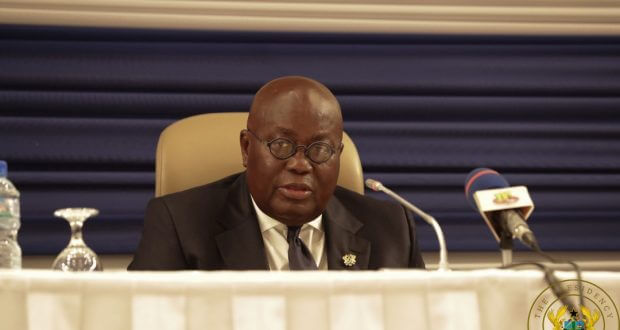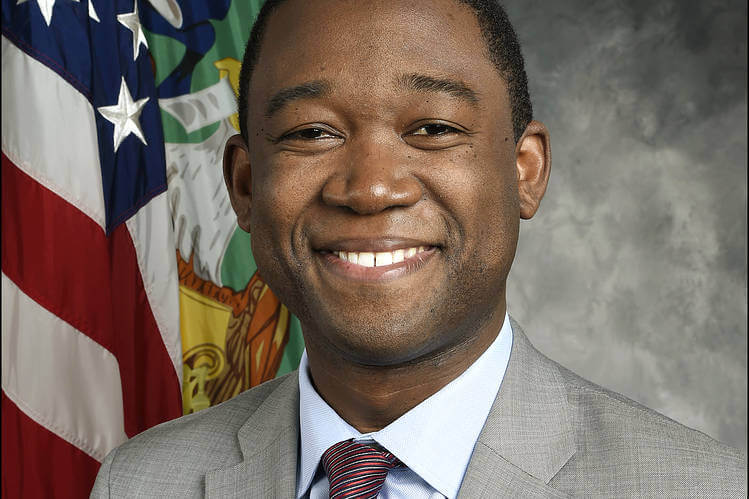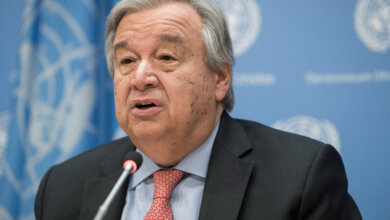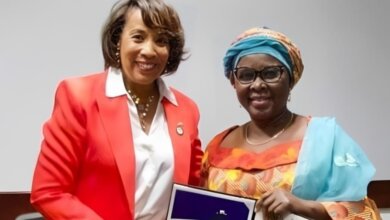Government cancels December 17 Referendum

The Akufo-Addo Government has cancelled the December 17 national referendum which was meant to decide on an amendment of Article 55 (3) of the Constitution to enable political parties to sponsor candidates during local level elections.
This was announced by President Nana Addo Dankwa Akufo-Addo in a brief address to the nation on Sunday, December 1, 2019.
The President attributed the decision to the absence of “a durable national consensus” on the matter following consultations.
“In these circumstances, I am convinced that it will not serve the public interest to go ahead with the holding of the public referendum on 17th December even though I believe a strong campaign for a YES vote would have succeeded. This is not the kind of atmosphere in which the repeal of an entrenched provision of the Constitution should take place.”
He also directed the Local Government and Rural Development Minister, Hajia Alima Mahama to withdraw the Bills seeking to amend Articles 55 (3) and 243 (1).
“It is with deep regret that I have given instructions to the Minister of Local Government and Rural Development…to abort the process and see to the withdrawal of the Bills for the amendment of the constitutions both in respect of Article 243 (1) and Article 55 (3).”
About December 17th Referendum
The Electoral Commission (EC) had scheduled December 17, 2019, to conduct the referendum to approve the Bill to amend Clause 3 of Article 55 of the 1992 Constitution.
This Bill was to allow political parties to fund candidates for election to district assemblies and lower local government units.
The purpose of the referendum was to see if Ghanaians were in favour of the Bill to amend Clause 3 of Article 55 of the 1992 Constitution or not.
Article 55(3) states that “subject to the provisions of this article, a political party is free to participate in shaping the political will of the people, to disseminate information on political ideas, social and economic programmes of a national character and sponsor candidates for elections to any public office other than to District Assemblies or lower local government units’’.
Consequently, Parliament was to also amend Article 243 (1) to allow Ghanaians to vote for their Metropolitan, Municipal and District Chief Executives (MMDCEs) instead of being appointed by the President.
Article 243 (1) states that: “There shall be a District Chief Executive for every district who shall be appointed by the President with the prior approval of not less than two-thirds majority of members of the Assembly present and voting at the meeting.”
NDC kicks against referendum
As the referendum day drew closer, there was a noticeable split among major stakeholders and observers.
After a seeming consensus on a YES vote in the referendum, the National Democratic Congress (NDC) started advocating for a NO vote.
The NDC was worried that an amendment will open district assemblies and unit committees to “the needless NDC-NPP polarisation.”
The NDC’s flagbearer, John Mahama also backed his party’s position suggesting that an amendment of Article 243(1) of the constitution was more necessary.
Read Also: Government committed to digitizing the Ghanaian economy — Samira Bawumia
Per Article 243 (1) of the 1992 Constitution, District Chief Executives for every district are to be appointed by the President with the prior approval of not less than two-thirds majority of members of the assembly present and voting at the meeting.
The General Secretary of the NDC, Johnson Asiedu Nketia further claimed the government had not held any consultations with the party on the referendum.
The governing New Patriotic Party (NPP) was in favour of a YES vote saying the amendment to the constitution will bolster Ghana’s democracy.
Read Also: Tunisians elect a law professor as new president
National House of chiefs divided over referendum
Traditional leaders were also in disagreement over the need for partisan participation in the district level elections.
The National House of Chiefs in a statement issued and signed by its President Togbe Afede XIV argued that decentralisation would negatively be affected by the control of local parties.
But the Paramount Chief of the Akyem Abuakwa traditional area and President of the Eastern Region House of Chiefs, Okyenhene Osagyefo Amoatia Ofori Panin II urged Ghanaians to ignore calls for a NO vote in the national referendum.
There had already been indications that traditional leaders were not on the same page after Chairman of the Governance Committee of the House, Ogyeahoho Yaw Gyebi II of Sefwi Anhwiaso in the Western Region told Citi News that the stance of the National House of Chiefs did not represent the collective view of the chiefs.
More than half of Ghanaians not aware of upcoming referendum – Afrobarometer report
While the debates on YES or NO votes lingered, a new Afrobarometer report disclosed that over 50 percent of Ghanaians said they were not aware of the upcoming referendum.
Of the less than 42 percent of Ghanaians who are aware of the referendum, the report said men, the highly educated, and elderly citizens were more aware of the referendum than women, citizens with less schooling, and young adults.
Awareness of the referendum increased with respondents’ level of education.
It reached 62 percent among those with post-secondary education, compared to 35 percent to 42 percent among those with less schooling.
Men, comprising 52 percent, are more likely to be aware of the referendum than women; 32 percent.
The awareness increased with age, ranging from 40 percent of youth to 47 percent of those over age 55.
Over 60% of Ghanaians are aware of referendum – ILGS counters Afrobarometer report
But the Institute of Local Government Studies also released a counter-report which indicated that more than 60 percent of Ghanaians were aware of the upcoming referendum and had a good understanding of the exercise.
Presenting the findings at a press conference recently, Director for the Institute, Dr. Nicholas Awortwi, however, indicated that voters in their twenties were the least aware of the impending exercise.
Dr. Awortwi further noted that more than sixty percent of the electorate will turn up at the polls with 75 percent of that number, voting YES.
“The results that we found was that about 66 percent of registered voters of 16.8 million are aware of the referendum of which 67 percent are ready to turn up. Of this 67 percent that are willing to turn up, 75 percent said they will vote YES if the elections were organized at the time when we organized the study.”
Local Gov’t Minister answers 22 critical questions on December referendum
The Minister of Local Government and Rural Development, Hajia Alima Mahama last week responded to some 22 questions posed her by the Chamber for Local Governance (ChLoG), on the December 17 referendum.
ChLoG had among other things questioned why government was prioritizing the referendum over Article 243 (1) which when amended will enable Ghanaians to vote for their own Metropolitan Municipal and District Chief Executives.
“That is exactly what is happening. Amendment to Article 243(1) has been prioritized. The amendment Bill was the first to be processed. It is presently in Parliament and has gone through all the required processes. It is at the last stage which requires a vote by Members of Parliament (MPs) to approve the Bill. If we work hard it may be approved before 17th December 2019,” she answered.
The Ministry of Local Government and Rural Development (MLGRD) in a statement answered all the 22 questions asked by ChLoG.
NPP campaign promise on election of MMDCEs
The election of Metropolitan Municipal and District Chief Executives (MMDCEs) was a major campaign promise of the New Patriotic Party in the run-up to the 2016 election.
The New Patriotic Party in its 2016 manifesto, promised to “oversee the direct election of Metropolitan, Municipal and District Chief Executives (MMDCEs) within 24 months of election into office, to coincide with the next District Assembly elections in 2019.”
Postponing or withdrawing referendum not possible – Lawyer
Private legal practitioner, John Ndebugri had earlier said calls for the postponement or withdrawal of the December 17 referendum were unfounded.
According to him, all the constitutional requirements for the exercise had been followed.
Speaking to Citi News, the former Member of Parliament for the Bawku West indicated that even the decision to call off the referendum was no longer within the power of the Executive or Legislature.
“The referendum cannot be withdrawn or postponed. If a decision is taken to amend an entrenched clause of the 1992 constitution, the government will publish the intention in the gazette six months in advance and then lay the Bill before Parliament for the House to refer it to the Council of State. The Council will consider the proposal and advice for or against.”
“Then it goes back to Parliament for the Electoral Commission to put the question before the nation through a referendum. We have passed through all that and so the matter is no longer within the ambit of the Executive. It is even not within the powers of Parliament because it is now with the Electoral Commission,” he said.
Akufo-Addo gives further on reasons for cancellation of the referendum
Explaining the rationale for his decision for the cancellation of the referendum, the President stated that that he came into office, nearly three years ago, with the firm conviction, emanating from the campaign and national discussions, that there was a national consensus for two important amendments to the country’s governance system, which would enhance its effectiveness and accountability – the reorganization of the country’s regional governance structure, and the potential involvement of political parties in local governance.
It was in furtherance of this and other matters that, on Tuesday, 18th April, 2017, a little over four (4) months into my mandate, he held a meeting with his three predecessors, their Excellencies Jerry John Rawlings, John Agyekum Kufuor, and John Dramani Mahama, at Jubilee House, to seek their views and counsel on these issues.
“I came away from that meeting with the view that there was consensus amongst us that the time had come for political parties to participate openly in district assembly elections and local governance,” he said.
President Akufo-Addo noted that, indeed, amongst the leadership of Parliament and amongst Members of Parliament on both sides, and amongst, virtually, all stakeholders who had been consulted either by him, or by the Minister for Local Government and Rural Development, the clear indications were that there was a broad national consensus for the repeal of article 55(3).
Debunking the notion that elections in Ghana’s 4th Republic have been divisive, the President stated that elections have rather been a unifying factor in the politics of the 4th Republic, the reason why “we have experienced the longest, uninterrupted period of stable, constitutional governance in our history, banishing the spectre of instability that disfigured the early years of our nation’s existence, and the benefits are still showing. It would also mean that freedom of association, which is one of the most fundamental freedoms in any democracy, would be given full expression in Ghanaian democracy.”
NDC U-turn
Regrettably, President Akufo-Addo stated that the main opposition party, the National Democratic Congress, made a U-turn, and stated that it was no longer prepared to go along with the national consensus.
“They indicated further that they will actively campaign for a ‘No’ vote. In as much as I still believe that there is enough support in the country for a ‘Yes’ vote to be successful on 17th December, I do not believe that this is the proper atmosphere in which an issue of such nature, i.e. the repeal of an entrenched provision of the Constitution, should be addressed in our country,” he said.
Even after their U-turn, the President revealed that he undertook consultations across a broad range of opinion as to the way forward, with the general result being that the process of repeal should be put on hold, for the time being, to enable a durable, national consensus to be forged on this matter.
“In these circumstances, I am convinced that it will not serve the public interest to go ahead with the holding of the Referendum on 17th December, even though I believe a strong campaign for a ‘Yes’ vote would have succeeded. This is not the kind of atmosphere in which the repeal of an entrenched provision of the Constitution should take place,” he added.
Despite having an unrepentant belief in party politics being good for the country, President Akufo-Addo stated that “I also think that, on matters of such constitutional significance, there should be a broad, national consensus behind the repeal of an entrenched provision of the Constitution”.
The President assured that his Government will continue to work for a broad, national consensus on the issue, adding that “should such a consensus be attained for the repeal of article 55(3) of the Constitution, and an agreement reached for political parties to participate in and sponsor candidates for election to district assemblies, at any point during my tenure of office as President of the Republic, the matter will be brought again back to the front burner of our public discourse for the necessary action”.
Source: Citinewsroom.com
Christopher Sam is a savvy web designer and developer with advanced knowledge in Search Engine Optimization. The certified Google Trainer is also a trusty contributor to this website.





